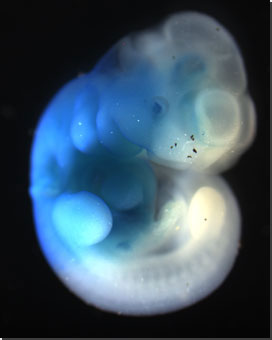Mouse model could spare studies
 A new synthetic mouse embryo could reduce the use of experimental animals.
A new synthetic mouse embryo could reduce the use of experimental animals.
International researchers have developed a synthetic, stem cell-derived mouse embryo using a combination of stem cells from mice.
In recent experiments, the synthetic embryo was able to copy the stages of mouse embryo development up to 8.5 days post-fertilisation and established all the brain regions, a neural tube, a beating heart, and a gut tube.
The scientists behind the new development have even been able to demonstrate that disabling a gene called Pax6 - involved in the development of the eyes and other sensory organs - in their embryoid model resulted in similar effects to those seen in non-synthetic Pax6 diabled mouse embryos.
The experts say the synthetic embryo can help understand factors that regulate the early stages of development, without the need for experimental animals.
More details are accessible here.








 Print
Print